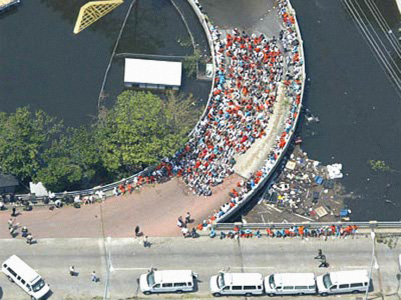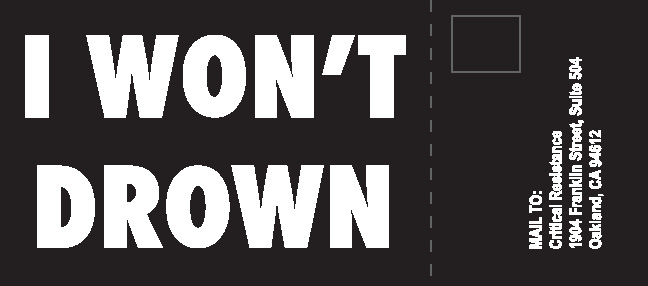
Bridge next to Orleans Parish Prison with evacuated prisoners during the flood.
Project Background
In the months following Hurricane Katrina, Ashley Hunt joined a number of organizations in New Orleans — Critical Resistance, Families and Friends of Louisiana’s Incarcerated Children, the NAACP Legal Defense Fund, the ACLU and Human Rights Watch, in order to help document what had happened at the Orleans Parish Prison during and after the flood. From this trip, he produced a short documentary that became a centerpiece to a campaign seeking amnesty for people arrested during the storm. Titled, “I Won’t Drown on that Levee and You Ain’t Gonna’ Break My Back,” it was shown around the U.S. and abroad in art and cinema venues and in numerous grassroots venues with organizations engaged in this campaign. As this short film took on a life of its own, Hunt continued to work from this material, thinking and writing his way through a number of ideas that had been triggered by his experience. One piece of writing that came out of it was published as an essay in the Journal of Aesthetics and Protest #5, 2007 and was intended to become a script for a film or video installation. But through a series of experiments in which he performed the materials of that film live, it became the script for a performance instead — “Notes on the Emptying of a City,” which acts very much like an essay film that has been taken apart, negotiated live. With its different pieces held together by the thread of their performance and the active witnessing of an audience, its form is compelling yet uncomfortable, supporting an uncomfortable subject matter, activating the relations of the room and leading to lively discussion and debate.
“Notes on the Emptying of a City” has been supported by Project Row Houses, the Visual Artists Network Exhibition Residency, which is a program of the National Performance Network, and the Art School of California Institute of the Arts.

Front of postcard used to distribute the film and gather petition signatures.